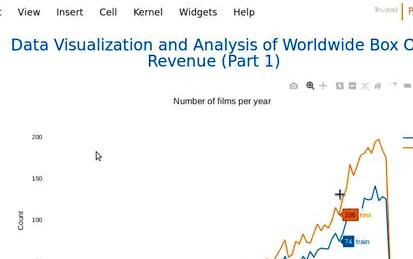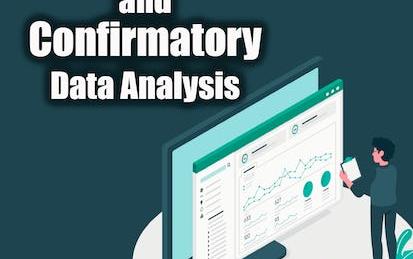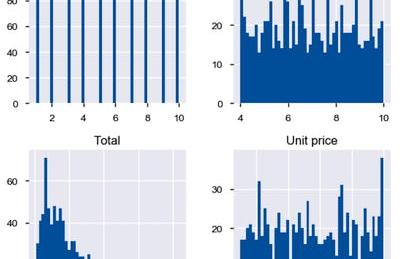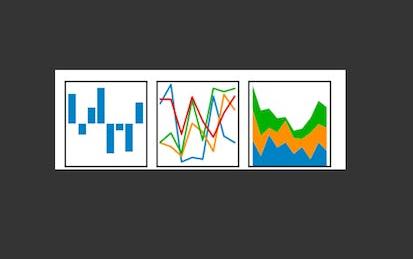

Our Courses

Data Science with R - Capstone Project
In this capstone course, you will apply various data science skills and techniques that you have learned as part of the previous courses in the IBM Data Science with R Specialization or IBM Data Analytics with Excel and R Professional Certificate. For this project, you will assume the role of a Data Scientist who has recently joined an organization and be presented with a challenge that requires data collection, analysis, basic hypothesis testing, visualization, and modeling to be performed on real-world datasets.
-
Course by

-
 Self Paced
Self Paced
-
 26 hours
26 hours
-
 English
English

Specialized Models: Time Series and Survival Analysis
This course introduces you to additional topics in Machine Learning that complement essential tasks, including forecasting and analyzing censored data. You will learn how to find analyze data with a time component and censored data that needs outcome inference. You will learn a few techniques for Time Series Analysis and Survival Analysis.
-
Course by

-
 Self Paced
Self Paced
-
 11 hours
11 hours
-
 English
English

Unsupervised Machine Learning
This course introduces you to one of the main types of Machine Learning: Unsupervised Learning. You will learn how to find insights from data sets that do not have a target or labeled variable. You will learn several clustering and dimension reduction algorithms for unsupervised learning as well as how to select the algorithm that best suits your data.
-
Course by

-
 Self Paced
Self Paced
-
 23 hours
23 hours
-
 English
English

Marketing Analytics Capstone Project
This capstone project will give you an opportunity to apply what we have covered in the Foundations of Marketing Analytics specialization. By the end of this capstone project, you will have conducted exploratory data analysis, examined pairwise relationships among different variables, and developed and tested a predictive model to solve a marketing analytics problem. It is highly recommended that you complete all courses within the Foundations of Marketing Analytics specialization before starting the capstone course.
-
Course by

-
 Self Paced
Self Paced
-
 11 hours
11 hours
-
 English
English

IBM Data Analyst Capstone Project
By completing this final capstone project you will apply various Data Analytics skills and techniques that you have learned as part of the previous courses in the IBM Data Analyst Professional Certificate. You will assume the role of an Associate Data Analyst who has recently joined the organization and be presented with a business challenge that requires data analysis to be performed on real-world datasets.
-
Course by

-
 Self Paced
Self Paced
-
 21 hours
21 hours
-
 English
English

Applied Data Science Capstone
This is the final course in the IBM Data Science Professional Certificate as well as the Applied Data Science with Python Specialization. This capstone project course will give you the chance to practice the work that data scientists do in real life when working with datasets.
-
Course by

-
 Self Paced
Self Paced
-
 13 hours
13 hours
-
 English
English

Analyze Box Office Data with Seaborn and Python
Welcome to this project-based course on Analyzing Box Office Data with Seaborn and Python. In this course, you will be working with the The Movie Database (TMDB) Box Office Prediction data set. The motion picture industry is raking in more revenue than ever with its expansive growth the world over. Can we build models to accurately predict movie revenue? Could the results from these models be used to further increase revenue? We try to answer these questions by way of exploratory data analysis (EDA) in this project and the next.
-
Course by

-
 Self Paced
Self Paced
-
 3 hours
3 hours
-
 English
English

Conducting Exploratory Data Analysis
Conduct exploratory data analysis with a systematic approach to investigate different aspects of your data: comparisons, relationships, compositions, and distributions. This guided project gives you a framework so you can conduct your own exploratory data analysis and make your work more professional and organized. The language is Python and the libraries used are seaborn, pandas, and matplotlib.
-
Course by

-
 Self Paced
Self Paced
-
 3 hours
3 hours
-
 English
English

Probability & Statistics for Machine Learning & Data Science
Newly updated for 2024! Mathematics for Machine Learning and Data Science is a foundational online program created by DeepLearning.AI and taught by Luis Serrano. In machine learning, you apply math concepts through programming. And so, in this specialization, you’ll apply the math concepts you learn using Python programming in hands-on lab exercises.
-
Course by

-
 Self Paced
Self Paced
-
 29 hours
29 hours
-
 English
English

Go Beyond the Numbers: Translate Data into Insights
This is the third of seven courses in the Google Advanced Data Analytics Certificate. In this course, you’ll learn how to find the story within data and tell that story in a compelling way. You'll discover how data professionals use storytelling to better understand their data and communicate key insights to teammates and stakeholders. You'll also practice exploratory data analysis and learn how to create effective data visualizations.
-
Course by

-
 Self Paced
Self Paced
-
 33 hours
33 hours
-
 English
English

Exploratory Data Analysis for the Public Sector with ggplot
Learn about the core pillars of the public sector and the core functions of public administration through statistical Exploratory Data Analysis (EDA). Learn analytical and technical skills using the R programming language to explore, visualize, and present data, with a focus on equity and the administrative functions of planning and reporting. Technical skills in this course will focus on the ggplot2 library of the tidyverse, and include developing bar, line, and scatter charts, generating trend lines, and understanding histograms, kernel density estimations, violin plots, and ridgeplots.
-
Course by

-
 Self Paced
Self Paced
-
 18 hours
18 hours
-
 English
English

Deep Learning and Reinforcement Learning
This course introduces you to two of the most sought-after disciplines in Machine Learning: Deep Learning and Reinforcement Learning. Deep Learning is a subset of Machine Learning that has applications in both Supervised and Unsupervised Learning, and is frequently used to power most of the AI applications that we use on a daily basis. First you will learn about the theory behind Neural Networks, which are the basis of Deep Learning, as well as several modern architectures of Deep Learning.
-
Course by

-
 32 hours
32 hours
-
 English
English

Vertex AI: Qwik Start
This is a self-paced lab that takes place in the Google Cloud console. In this lab, you will use BigQuery for data processing and exploratory data analysis, and the Vertex AI platform to train and deploy a custom TensorFlow Regressor model to predict customer lifetime value (CLV). The goal of the lab is to introduce to Vertex AI through a high value real world use case - predictive CLV. Starting with a local BigQuery and TensorFlow workflow, you will progress toward training and deploying your model in the cloud with Vertex AI.
-
Course by

-
 Self Paced
Self Paced
-
 2 hours
2 hours
-
 English
English

Exploratory Data Analysis in R
In this 1-hour long project-based course, you will learn how to do basic exploratory data analysis (EDA) in R, automate your EDA reports and learn advanced EDA tips Note: This course works best for learners who are based in the North America region.
-
Course by

-
 Self Paced
Self Paced
-
 2 hours
2 hours
-
 English
English

Create Machine Learning Models in Microsoft Azure
Machine learning is the foundation for predictive modeling and artificial intelligence. If you want to learn about both the underlying concepts and how to get into building models with the most common machine learning tools this path is for you. In this course, you will learn the core principles of machine learning and how to use common tools and frameworks to train, evaluate, and use machine learning models. This course is designed to prepare you for roles that include planning and creating a suitable working environment for data science workloads on Azure.
-
Course by

-
 Self Paced
Self Paced
-
 13 hours
13 hours
-
 English
English

Analyze Data in a Model Car Database with MySQL Workbench
In this project, you’ll perform exploratory data analysis for Mint Classics Company, a retailer of model cars. The company is looking to close one of its storage facilities. Your objective is to recommend inventory reduction strategies that won’t negatively impact customer service. Using MySQL Workbench, you’ll familiarize yourself with the sample database, run SQL queries to identify factors affecting storage space and propose inventory reduction approaches.
-
Course by

-
 Self Paced
Self Paced
-
 3 hours
3 hours
-
 English
English

Mining Quality Prediction Using Machine & Deep Learning
In this 1.5-hour long project-based course, you will be able to: - Understand the theory and intuition behind Simple and Multiple Linear Regression. - Import Key python libraries, datasets and perform data visualization - Perform exploratory data analysis and standardize the training and testing data. - Train and Evaluate different regression models using Sci-kit Learn library. - Build and train an Artificial Neural Network to perform regression. - Understand the difference between various regression models KPIs such as MSE, RMSE, MAE, R2, and adjusted R2. - Assess the performance of regressio
-
Course by

-
 Self Paced
Self Paced
-
 2 hours
2 hours
-
 English
English

Fundamentals of Machine Learning for Supply Chain
This course will teach you how to leverage the power of Python to understand complicated supply chain datasets. Even if you are not familiar with supply chain fundamentals, the rich data sets that we will use as a canvas will help orient you with several Pythonic tools and best practices for exploratory data analysis (EDA). As such, though all datasets are geared towards supply chain minded professionals, the lessons are easily generalizable to other use cases.
-
Course by

-
 Self Paced
Self Paced
-
 13 hours
13 hours
-
 English
English

Exploratory Data Analysis in AWS
Exploratory Data Analysis in AWS is the second course in the AWS Certified Machine Learning Specialty specialization. The main focus of this course is to analyze Data Streams and Data Analytics services in AWS along with exploring Data Analysis in AWS. This course is divided into two modules and each module is further segmented by Lessons and Video Lectures. This course facilitates learners with approximately 2:00-2:30 Hours Video lectures that provide both Theory and Hands -On knowledge. Also, Graded and Ungraded Quiz are provided with every module in order to test the ability of learners.
-
Course by

-
 5 hours
5 hours
-
 English
English

Machine Learning with PySpark: Customer Churn Analysis
This 90-minute guided-project, "Pyspark for Data Science: Customer Churn Prediction," is a comprehensive guided-project that teaches you how to use PySpark to build a machine learning model for predicting customer churn in a Telecommunications company. This guided-project covers a range of essential tasks, including data loading, exploratory data analysis, data preprocessing, feature preparation, model training, evaluation, and deployment, all using Pyspark.
-
Course by

-
 Self Paced
Self Paced
-
 3 hours
3 hours
-
 English
English

Supervised Machine Learning: Classification
This course introduces you to one of the main types of modeling families of supervised Machine Learning: Classification. You will learn how to train predictive models to classify categorical outcomes and how to use error metrics to compare across different models.
-
Course by

-
 Self Paced
Self Paced
-
 25 hours
25 hours
-
 English
English

Basic Statistics in Python (ANOVA)
In this 1-hour long project-based course, you will learn how to set up a Google Colab notebook, source data from the internet, load data into Python, merge two datasets, clean data, perform exploratory data analysis, carry out ANOVA and create boxplots.
-
Course by

-
 Self Paced
Self Paced
-
 4 hours
4 hours
-
 English
English

Exploratory vs Confirmatory data analysis using Python
This Guided Project, Exploratory and Confirmatory Data Analysis using python, is for those who want to learn about different methods of data analysis. In this 2-hour-long project-based course, you will understand and apply Exploratory Data Analysis, build different Data visualizations, apply different exploration techniques based on the data at hand and define and understand the concept of Confirmatory Data Analysis. This project is unique because you will learn how and where to start your data exploration.
-
Course by

-
 Self Paced
Self Paced
-
 2 hours
2 hours
-
 English
English

Exploratory Data Analysis With Python and Pandas
In this 2-hour long project-based course, you will learn how to perform Exploratory Data Analysis (EDA) in Python. You will use external Python packages such as Pandas, Numpy, Matplotlib, Seaborn etc. to conduct univariate analysis, bivariate analysis, correlation analysis and identify and handle duplicate/missing data. Note: This course works best for learners who are based in the North America region. We’re currently working on providing the same experience in other regions.
-
Course by

-
 Self Paced
Self Paced
-
 3 hours
3 hours
-
 English
English

Practical Data Wrangling with Pandas
In this project, we will analyze life expectancy data by performing data wrangling & exploratory data analysis (EDA). Pandas is a powerful open source data analysis tools in python. Exploratory Data Analysis (EDA) is a process of analyzing data to gain valuable insights such as statistical summary & visualizations.
-
Course by

-
 Self Paced
Self Paced
-
 2 hours
2 hours
-
 English
English



